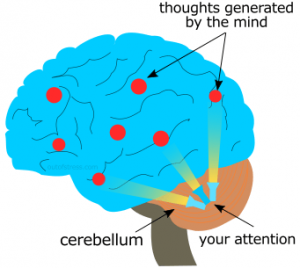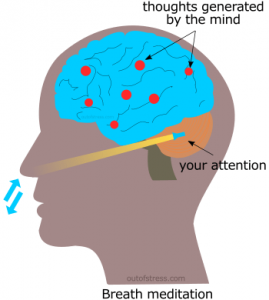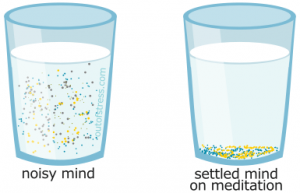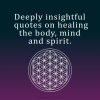Relaxation is an exceptionally powerful state. It is a state of expansion.
It has the power to heal your mind and body, raise your vibration, induce creative states, generate inner peace, attract abundance and release stuck energy.
On the contrary, when the body is under prolonged stress, it starts to performs below par, starts incurring damage and eventually succumbs to chronic and autoimmune diseases.
If relaxation is expansion, stress is contraction.
What relaxation is not
Most of us have been sold the idea that relaxation entails taking a vacation, eating out, going to the movies or watching T.V.
Even though these activities can help you take your mind off of your routine work, they certainly do not do a good job at relaxing your mind and body.
For example, vacations can often lead to stressful experiences, like adapting to the new surroundings, inability to sleep in the new settings, inability to adjust to the food etc. No wonder when you come back from a vacation, you often feel more stressed out than before.
How about sleep then? Can sleep cause relaxation?
Yes, sleep definitely helps the body relax and thereby restore itself. But that totally depends on the quality of sleep you experience.
Not every sleep is of high quality.
As we sleep, our body moves through various sleep states. These sleep states can be broadly classified into Non-REM (NREM) and REM states. NREM states can be further classified into three states known as the N1, N2 and N3.
Out of these three, the N3 state is known as the ‘deep sleep state’ when the brain activity is at its lowest and the muscles of the entire body are fully relaxed. This is also the state when the body starts to restore and repair itself.
So in order to feel relaxed during sleep, you need to reach the N3 state. But your quality of sleep varies every night and depending on the quality, you may or may not experience N3 states for optimal duration.
This is generally the case when you are stressed out.
So if stress can affect our sleep quality, sleep cannot necessarily be called relaxing at all times. It is not a reliable relaxation method.
So what is the optimal way to relax?
The optimal way to relax is to relax consciously, the term for which is – ‘Conscious Relaxation’.
It involves becoming conscious of your mind and body and then relaxing them by practicing letting go. You let go of your thoughts and your stuck emotions and in the process experience deep relaxation states.
The more you practice this, the easier it will become and you will have the ability to experience deeper and deeper relaxation states. States you never thought even existed.
People take drugs like marijuana to reach higher (relaxing) states. But you don’t need that. You can recreate these states simply by practicing conscious relaxation!
So let’s start by learning how to consciously relax the mind, followed by how to consciously relax the body and then how to do both together.
Consciously relaxing your mind
Simply put, consciously relaxing the mind involves consciously relaxing your ‘attention’ by letting go of thoughts.
On a regular basis, your mind produces a myriad of thoughts and at any given moment, your attention is lost between these thoughts. It keeps jumping from one thought to another as illustrated in the image below.

Your attention is very powerful. Hence, the moment you give attention to a thought, the thought becomes powerful and more related thoughts are generated. The more attention you give, the more powerful the thought becomes.
This is of-course not limited to thoughts generated by the mind. It also extends to sensory inputs (like watching a t.v. program), listening to sounds, experiencing feelings etc.
It is important to realize that your ‘attention’ is also part of your mind. It is the part of the mind that has the ability to interpret and understand thoughts, feelings and emotions. Without your attention, none of your thoughts, feelings and emotions will make any meaning. They will simply happen and dissipate in the background.
When your attention is constantly lost in your thoughts, it overworks your mind. An overworked mind puts your nervous system into sympathetic mode (fight or flight response). Your start to feel contracted.
So what’s the solution? How do you consciously relax your mind?
To relax your mind, you will need to consciously relax your ‘attention’. In other words, stop paying your attention to thoughts. Simply let the thoughts go.
For an untrained mind, it becomes very difficult to remove attention from thoughts but here are a couple of techniques that you can use to start training your mind to relax:
- Diverting your attention from thoughts to a sensation.
- De-focusing your attention.
1. Diverting your attention to a sensation: Your thoughts thrive on your attention. Your attention gives them energy. If you divert your attention from your thoughts, they begin to starve. After a few seconds of starving your thoughts this way, your thoughts begin to settle down.
The simplest technique to achieve this is to divert your attention to the sensation of breathing.
Consciously feel the cool air caressing the tip of your nostrils as you breath in and the warm air escaping as you breath out. If a thought pulls your attention (which it will), gently bring your attention back to your breath. Doing this for a few minutes is enough to settle the brain down. The longer you do this, the more relaxed your mind becomes.

Here’s an analogy, let’s say there is a glass filled with sediments. If you keep stirring the water, the water appears muddy, but if you allow the water to be still, the sediments settle down and there is clarity. This is exactly what happens when you pull your attention away from thoughts. They begin to settle down.

2. De-focusing your attention: The above technique involved focusing your attention to a single point. This technique on the other hand involves de-focusing – not focusing on anything.
Instead of interpreting your thoughts, you simply become a neutral observer of everything in and around you. Close your eyes and simply observe without interpreting. Observe your thoughts as they begin to settle down, observe your surroundings through your mind’s eye.
In this state, you go from doing to simply being.
You can alternate between focusing and de-focusing your attention to achieve a deep inner peace and relaxation.
Consciously relaxing your body
To consciously relax your body, you first need to get in touch with your body.
Even though this is an extremely natural thing, we are never taught how to do this, hence as we grow up, we get stuck in our minds and completely ignore our bodies.
The simplest way to get in touch with your body is to practice – Body scanning. Body scanning involves feeling your body from within and consciously relaxing tension areas.
To scan your body, close your eyes and divert your attention within your body. Just like you diverted your attention to focus on your breathing, you divert your attention within your body. Feel free to scan your entire body or areas that you are most drawn to. You will automatically be drawn to areas that require healing.
Without your conscious knowledge a lot of areas in your body might be under stress. Stress leads muscles in these areas to clench. So feel your body and unclench these areas. Here are some areas you should focus on:
- Feel the top, sides and back of your head and see if you can sense any kind of clenching. Let go and relax to unclench these areas.
- Feel if the muscles around your shoulders are clenched and relax them.
- Feel your heart beats and if your heart is beating too fast, relax it so it slows down a little.
- Feel if the muscles around your abdomen are clenched and relax them.
- Feel if your butt muscles are clenched and relax it.
- Feel if your thigh muscles are clenched and relax them.
- Feel your palms and the soles of your feet and relax these areas. You might also be able to sense energy radiating from these areas.
If during this exercise, your attention returns to your thoughts (which it will), gently bring it back to your body.
Once you are aware of which body parts tense up the most, consciously relax these body parts throughout the day. For me it was the back of my head that used to tense up whenever I was engaged in activity. I made it a point to relax these particular muscles multiple times a day until it became an automatic habit.
It is important to note at this point that thoughts are to the mind as emotions are to the body. Every thought creates an emotion in the body. Some of these emotions are released whereas some remain stuck in the body. This is generally the case when an emotion is suppressed.
The best way to release suppressed emotions is to consciously feel them.
As you scan your body, consciously feel these emotions. Do not shy away from them. As you consciously feel your emotions, they start to release and this way you can remove stuck energy.
Note that on a day to day basis, we feel the effects of the emotions, but not the emotion in itself. For example, an emotion might cause us to become sad, which is an effect of the emotion. Instead of focusing on the sadness (which is the effect), we divert our focus to the energy of the emotion itself.
My results with body scanning
As I started scanning my body around 2 years ago, I realized that the muscles near the cerebellum (back of the head where the neck muscles join with the skull) automatically clench whenever I am engaged in activity. This even included so called relaxing activities like watching tv. (Even when we are watching TV we are still processing information.)
This lead to a feeling of disorientation, confusion often accompanied by headaches. As time passed, I also developed auto-immune diseases like eczema (right around the back of the neck) along with digestive issues.
But once I started scanning my body I realized my clenched muscles and started to relax them not once, not twice, but many times over. This is because, once I stopped relaxing them, they would clench again.
The odd thing was that I would sometimes wake up during sleep after a dream and found my muscles clenched again. I would then consciously relax them as I went back to sleep.
After a few months of doing this, my eczema started to reduce and my digestion processes started to improve. Even the muscles stopped clenching as much.
Body scanning is a powerful relaxation technique and can give you amazing results if you are consistent.
Relaxing body and mind together
The best form of relaxation entails relaxing the mind and body together.
The simplest way to achieve this is to consciously relax your body as you meditate.
The meditation can be focused meditation where you focus on your breath or a mantra. Or it can be a de-focused meditation where you do not focus on anything. As you meditate, stay aware of your body and relax areas of your body that usually clench up. For example, if you find that the back of your head usually remains clenched, relax this area as you meditate.
Relaxing your mind and body this way before you go to sleep can result in you experiencing deeper sleep states that are highly restorative.
Combining conscious relaxation with sleeping
A great way to achieve great results is to combine conscious relaxation with sleeping.
Before you go to sleep, take a few moments to consciously relax your mind and body. You can do this even while lying down in bed. When you doze off to sleep with your thoughts settled down and your body fully relaxed, you will experience deep sleep states that are highly restorative. Practice this for a few nights and you will find yourself waking up full of positive energy.







